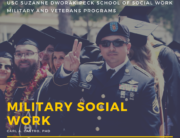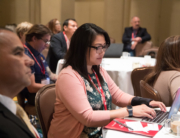The USC School of Social Work convened its first military social work conference for more than 25 multidisciplinary scholars at the USC San Diego Academic Center on Mar. 4 to explore collaborative military family-themed research opportunities.
The meeting brought together participants from the school’s Hamovitch Center for Science in the Human Services and Center for Innovation and Research on Veterans and Military Families, the Child and Adolescent Services Research Center (CASRC) at Rady Children’s Hospital in San Diego and the Naval Health Research Center to discuss the provision of mental health and social services for military service members, veterans and their families, and the research that will develop evidence-informed practice.
“This was a ground-breaking opportunity for USC’s social work faculty to host this inaugural meeting,” said Jose Coll, chair of the school’s military social work program and director of the San Diego Academic Center. “We’re pleased that the researchers who attended are all extremely interested in collaborating to better understand PTSD (post-traumatic stress disorder), depressive disorders, alcohol and substance abuse, eating disorders and other illnesses experienced by military personnel.”
Tyler Smith, director of the Department of Defense Center for Deployment Health Research at the Naval Health Research Center, delivered the main presentation on the Millennium Cohort Study, the largest prospective health project in military history. As principal investigator, he was able to provide an update on the 21-year longitudinal study begun in 2001 to examine the long-term health effects related to service members’ deployments. He explained that the need for such a study arose out of lessons learned and research gaps stemming from the 1991 Gulf War.
The cohort study originally enrolled a three-panel sample of about 152,000 military personnel representing all of the services, including active duty and reserve/guard members. Smith said the next stage of the cohort study will survey 10,000 military spouses.
“We hope to be able to determine the effects military deployment has on the health and well-being of spouses and children of active duty personnel, enabling medical practitioners to provide preventative and improved treatments,” Smith said. “We will follow this cohort for the next 11 years and are excited to have the opportunity to work with expert researchers from USC, Duke, UCSF, Abt Associates and NHRC.”
Other presenters included Ava Conlin of the Department of Defense Center for Deployment Health Research on the DoD Birth and Infant Health Registry; Professor Kathy Ell from the USC School of Social Work on the current efforts by the USC Center for Research and Innovation on Veterans and Military Families to develop a military social work curriculum in collaboration with the Council on Social Work Education and research on the use of innovative technology to train social work clinicians in working with traumatized military personnel; Professor Ron Astor from the USC School of Social Work who described his work on school violence and outlined a proposed study on school violence in military-involved schools in San Diego County; and Ann Garland from CASRC/University of California, San Diego, who explained a proposed study with the U.S. Marine Corps on family service centers in Southern California and their ability to respond to the needs of military personnel and their families.
The meeting concluded with an agreement to develop a plan and procedures for initiating formal collaborations between the Department of Defense and academic researchers on topics of mutual interest. Professor Larry Palinkas of the USC School of Social Work and Smith will jointly develop the plan.
Those in attendance from the USC School of Social Work were Professors Astor, Julie Cederbaum, Coll, Ell, Tamika Gilreath, Erick Guerrero, Michael Hurlburt, Jan Nissly, Palinkas, Janet Schneiderman, Valvincent Reyes, Eugenia Weiss and Suzanne Wenzel, as well as Chris Frymire, assistant director of the Hamovitch Center.







